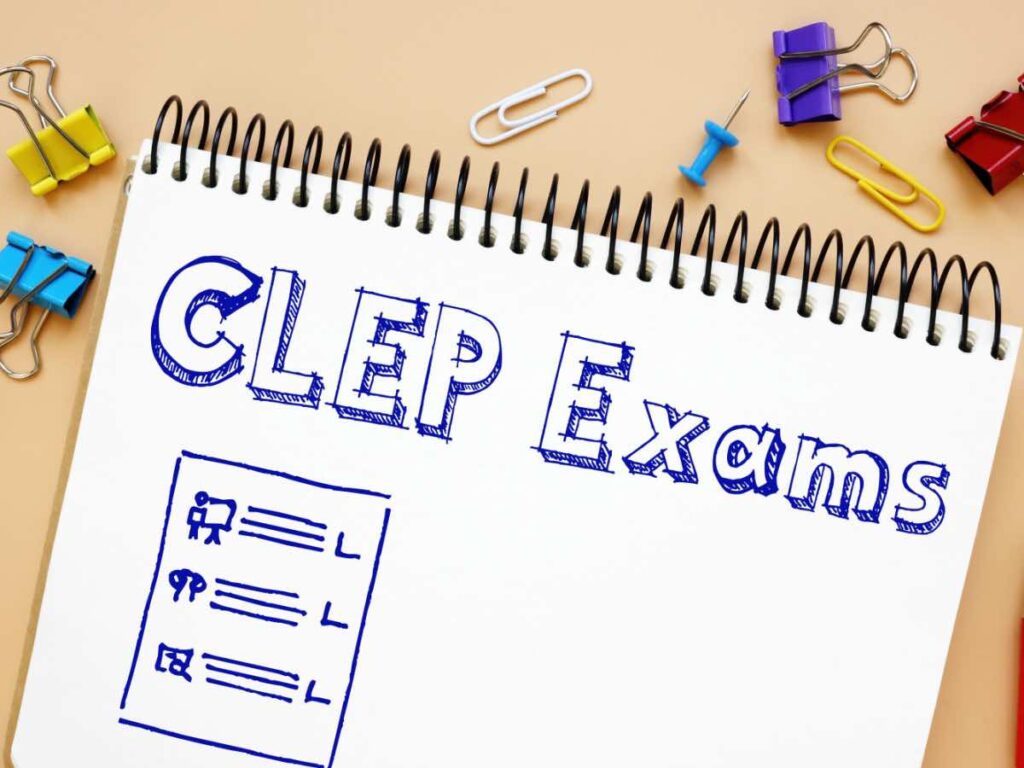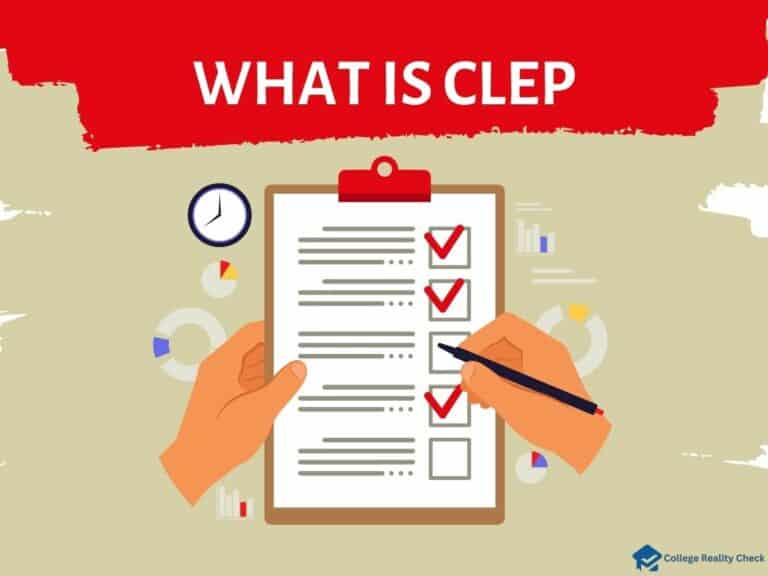10 Hardest and 10 Easiest CLEP Classes
Taking CLEP exams allows you to earn credits for various introductory college courses. It may not allow you to earn a complete undergraduate degree alright, but it can expedite the completion of your undergraduate degree program.
In the meantime, read on to know which CLEP tests are the most difficult and which ones are the easiest.
Sitting for the right CLEP exams lets you get scores high enough to win you college credits at a school that accepts CLEP, thus enabling you to save both time and money in your pursuit of an associate or bachelor’s degree.

CLEP Exam Topics Compared: Questions, Testing Time, Passing Rate
To have a much better idea of which CLEP classes are the hardest and which ones are the easiest, of course, we should determine some of the most important matters about each of them.
Other than finding the subject matter challenging or trouble-free, depending on your interests and background, knowing some exam topic-related specifics is a must, too.
Below, I will give you a table comparing all 34 CLEP examinations.
Making the said table essential in determining the difficulty level of the various CLEP classes so that you can make smart choices are the different comparison points taken into account, and they are the following:
- Approximate number of questions
- Total testing time
- B-level passing score
- Passing rate according military.com
Just before we talk about the said points, check out the table:
| CLEP Topics | Questions | Testing Time | B-Level Score | Passing Rate |
|---|---|---|---|---|
| Business | ||||
| Financial Accounting | 75 | 90 minutes | 65 | 21% |
| Information Systems | 100 | 90 minutes | 66 | 61% |
| Introductory Business Law | 100 | 90 minutes | 57 | 63% |
| Principles of Management | 100 | 90 minutes | 63 | 33% |
| Principles of Marketing | 100 | 90 minutes | 65 | 44% |
| Composition and Literature | ||||
| American Literature | 100 | 90 minutes | 53 | 36% |
| Analyzing and Interpreting Literature | 80 | 98 minutes | 59 | 70% |
| College Composition | 50 + 2 essays | 125 minutes | 59 | 70% |
| College Composition Modular | 90 | 95 minutes | 60 | 80% |
| English Literature | 95 | 90 minutes | 63 | 52% |
| Humanities | 140 | 90 minutes | 55 | 51% |
| History and Social Sciences | ||||
| American Government | 100 | 90 minutes | 64 | 53% |
| History of the United States I | 120 | 90 minutes | 61 | 47% |
| History of the United States II | 120 | 90 minutes | 60 | 43% |
| Human Growth and Development | 90 | 90 minutes | 58 | 64% |
| Introduction to Educational Psychology | 100 | 90 minutes | 63 | 37% |
| Introductory Psychology | 95 | 90 minutes | 55 | 38% |
| Introductory Sociology | 100 | 90 minutes | 56 | 63% |
| Principles of Macroeconomics | 80 | 90 minutes | 62 | 36% |
| Principles of Microeconomics | 80 | 90 minutes | 64 | 33% |
| Social Sciences and History | 120 | 90 minutes | 63 | 70% |
| Western Civilization I | 120 | 90 minutes | 55 | 44% |
| Western Civilization II | 120 | 90 minutes | 54 | 50% |
| Science and Mathematics | ||||
| Biology | 115 | 90 minutes | 56 | 54% |
| Calculus | 44 | 90 minutes | 64 | 47% |
| Chemistry | 75 | 90 minutes | 66 | 32% |
| College Algebra | 60 | 90 minutes | 63 | 26% |
| College Mathematics | 60 | 90 minutes | 63 | 67% |
| Natural Sciences | 120 | 90 minutes | 66 | 63% |
| Pre-Calculus | 48 | 90 minutes | 61 | 49% |
| World Languages | ||||
| French Language (levels 1 and 2) | 121 | 90 minutes | 64 and 69 | 46% |
| German Language (levels 1 and 2) | 120 | 90 minutes | 59 and 67 | 54% |
| Spanish Language (levels 1 and 2) | 121 | 90 minutes | 56 and 68 | 80% |
| Spanish with Writing (levels 1 and 2) | 100 + 2 essays | 110 minutes | 58 and 71 | 80% |
Let’s discuss how the different comparison points used in contrasting the different CLEP test topics against one another can help you have an idea of which CLEP exams are the hardest and easiest.
Questions
The number of CLEP exam questions can range anywhere from 44 to 140, all of which are multiple-choice questions, with the exception, of course, of writing sections — a couple of CLEP examinations, namely College Composition and Spanish with Writing, require test-takers to write up to 2 essays.
It goes without saying that the more multiple-choice questions are around, the more topics are covered by the CLEP class. So, in other words, you will have to read more during the CLEP test preparation phase.
Testing time
It’s not enough that you consider the number of questions a CLEP class has when determining whether it’s hard or easy — you should also take into account how many minutes test-takers have when trying to answer them correctly.
Take the number of questions for Calculus and Humanities, for instance.
Calculus has only 44 questions.
On the other hand, Humanities has a total of 140. But both CLEP examination topics have a testing time of 90 minutes.
Doing math, it means that every Calculus question needs to be answered in 2 minutes, while every Humanities question has to be answered in less than a minute only.
It doesn’t take a rocket scientist to know that, based on the number of minutes available for each question, Calculus is more difficult than Humanities as far as CLEP test topics go.
B-level score
According to the American Council on Education (ACE), which is a major coordinating agency for higher education institutions in the US, the recommended passing grade for CLEP examinations is B.
This means that CLEP test-takers should answer anywhere from 70% to 79% of all questions correctly for them to pass.
More importantly, they should get a B grade if they want to earn college credits.
A panel of college faculty who are teaching the equivalent course for CLEP examination topics, however, disagrees with ACE, which is why it has its own recommendation in terms of passing CLEP tests: the B-level credit-granting score.
Needless to say, test-takers, as far as the said team consisting of college faculty members is concerned, must correctly answer anywhere from 80% to 89% of all CLEP exam questions for them to pass as well as earn credits.
This means that if your top-choice institution’s CLEP credit policy follows the B-level approach, you will have to aim for a higher score.
But different colleges that accept CLEP can set the CLEP exam passing grade of their choosing.
And speaking of colleges where CLEP tests are honored, here’s a comprehensive post about institutions where you can take your CLEP scores — there are lots and lots of them, ranging from public schools to private liberal arts colleges.
Passing rate
The College Board, which is the non-profit organization that created and administers CLEP examinations, does not really publish the passing rate of CLEP tests — various sources, however, do.
Most of those who publish CLEP passing rates make public the rates for both civilian and military test-takers.
But the general rule of thumb is that one should consider the CLEP passing rate for military test-takers rather than civilian test-takers if the goal is to have a much more precise figure.
That’s because it usually takes more time for the military to come up with a report, which means that it can give a much better picture than civilian passing rates that come out frequently.
However, it’s not a good idea to establish the difficulty level of a CLEP class based solely on the passing rate, which can be affected by the knowledge and skills of the test-takers.
Take for example Spanish Language, which has a very high passing rate of 80% — of course, most students who would go for the said exam topic are very good with Spanish.
On the other hand, Financial Accounting has a low passing rate of 21% — having exceptional math skills is not enough as the discipline also requires critical thinking and organization skills.

CLEP Exam Difficulty Level Based on Passing Rates
Because the goal is to pass CLEP exams to earn college credits, it’s typically a good idea to consider the passing rate for each CLEP topic so that students may be able to register for tests wisely.
Naturally, as a general rule of thumb, the more test-takers pass a particular CLEP examination topic, the easier it’s likely to be.
Earlier, we compared all 34 CLEP exams using an assortment of comparison points.
In this part of the post, let’s determine which CLEP topics are the hardest and which ones are the easiest based solely on their passing rates — we will be using the 2020 military passing rate for each, in particular, for increased precision.
Top 10 hardest CLEP exams
| CLEP Exam | Passing Rate |
|---|---|
| Financial Accounting | 21% |
| College Algebra | 26% |
| Chemistry | 32% |
| Principles of Microeconomics | 33% |
| Principles of Management | 33% |
| American Literature | 36% |
| Principles of Macroeconomics | 36% |
| Introduction to Educational Psychology | 37% |
| Introductory Psychology | 38% |
| History of the United States II | 43% |
Top 10 easiest CLEP exams
| CLEP Exam | Passing Rate |
|---|---|
| College Composition Modular | 80% |
| Spanish with Writing (levels 1 and 2) | 80% |
| Spanish Language (levels 1 and 2) | 80% |
| Analyzing and Interpreting Literature | 70% |
| College Composition | 70% |
| Social Sciences and History | 70% |
| College Mathematics | 67% |
| Human Growth and Development | 64% |
| Introductory Sociology | 63% |
| Introductory Business Law | 63% |
Just Before You Register for a CLEP Exam
It goes without saying that opting for something that you can answer confidently can increase your chances of passing and, more importantly, earning college credits.
But other than determining which CLEP exams can win you credits, it’s also important to determine whether or not your top-choice institution accepts CLEP scores — attending one that does not honor CLEP tests, of course, makes taking a CLEP exam totally pointless.
Prior to registering, research the CLEP exam you like to take and the school you want to go to.
Related Questions
How do you pass CLEP exams?
The College Board offers official study guides and practice questions for CLEP test-takers at no cost. There’s also plenty of resources from various sites online. Being familiar with the testing platform can help in passing CLEP tests, too. Of course, it’s important to consider taking CLEP exams whose topics you are knowledgeable and passionate about.
Can you cheat on CLEP tests?
No matter if taking the CLEP exam at a test center or remotely, the session will be proctored by a human, which means that there’s no room for cheating. A test-taker who gets caught cheating will have his or her score canceled by the College Board. What’s more, the individual will be subject to not being allowed to take any CLEP examination ever again.
Disclaimer: The views and opinions expressed in this article are those of the authors and do not necessarily represent those of the College Reality Check.


